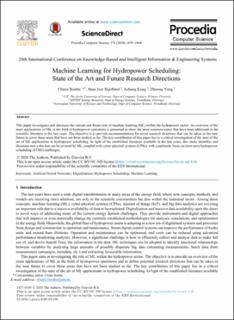| dc.contributor.author | Bordin, Chiara | |
| dc.contributor.author | Skjelbred, Hans Ivar | |
| dc.contributor.author | Kong, Jiehong | |
| dc.contributor.author | Yang, Zhirong | |
| dc.date.accessioned | 2020-10-22T12:41:48Z | |
| dc.date.available | 2020-10-22T12:41:48Z | |
| dc.date.created | 2020-10-03T10:19:31Z | |
| dc.date.issued | 2020 | |
| dc.identifier.citation | Procedia Computer Science. 2020, 176 1659-1668. | en_US |
| dc.identifier.issn | 1877-0509 | |
| dc.identifier.uri | https://hdl.handle.net/11250/2684525 | |
| dc.description.abstract | This paper investigates and discusses the current and future role of machine learning (ML) within the hydropower sector. An overview of the main applications of ML in the field of hydropower operations is presented to show the most common topics that have been addressed in the scientific literature in the last years. The objective is to provide recommendations for novel research directions that can be taken in the near future to cover those areas that have not been studied so far. The key contribution of this paper lies in a critical investigation of the state of the art of ML applications in hydropower scheduling. In light of the established literature available in the last years, this study identifies and discusses new roles that can be covered by ML, coupled with cyber-physical systems (CPSs), with a particular focus on short-term hydropower scheduling (STHS) challenges. | en_US |
| dc.language.iso | eng | en_US |
| dc.publisher | Elsevier | en_US |
| dc.rights | Attribution-NonCommercial-NoDerivatives 4.0 Internasjonal | * |
| dc.rights.uri | http://creativecommons.org/licenses/by-nc-nd/4.0/deed.no | * |
| dc.title | Machine Learning for Hydropower Scheduling: State of the Art and Future Research Directions | en_US |
| dc.type | Peer reviewed | en_US |
| dc.type | Journal article | en_US |
| dc.description.version | publishedVersion | en_US |
| dc.rights.holder | The Authors | en_US |
| dc.source.pagenumber | 1659-1668 | en_US |
| dc.source.volume | 176 | en_US |
| dc.source.journal | Procedia Computer Science | en_US |
| dc.identifier.doi | https://doi.org/10.1016/j.procs.2020.09.190 | |
| dc.identifier.cristin | 1836726 | |
| dc.relation.project | Norges forskningsråd: 309936 | en_US |
| cristin.ispublished | true | |
| cristin.fulltext | original | |
| cristin.qualitycode | 1 | |

